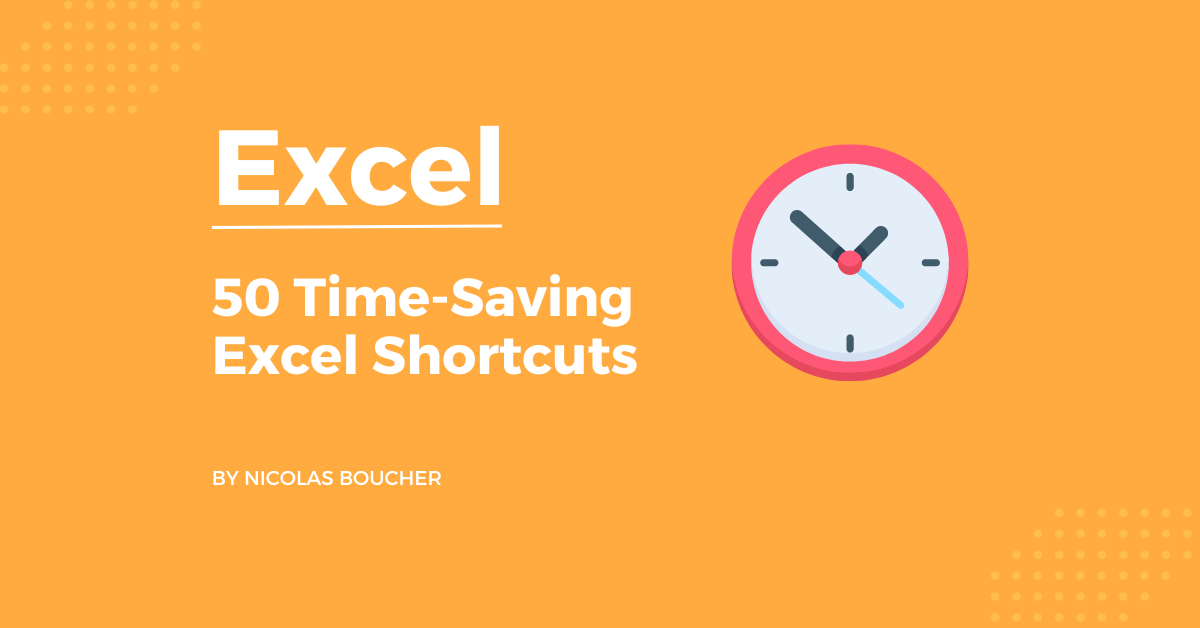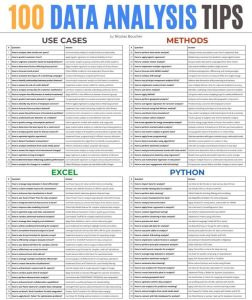Numerous keyboard shortcuts that Excel provides can help you operate more quickly and productively. More importantly, significant operations may be carried out with just two or three keystrokes rather than using the mouse to enter the toolbar. Isn’t that quicker and easier? Excel shortcuts significantly speed up work and cut down on the workload.
Therefore, Microsoft compiled 50 time-saving Excel Shortcuts (for Windows), which I will discuss today.
Table of Contents
Time-Saving Excel Shortcuts
Here are the four types of time-saving Excel shortcuts.
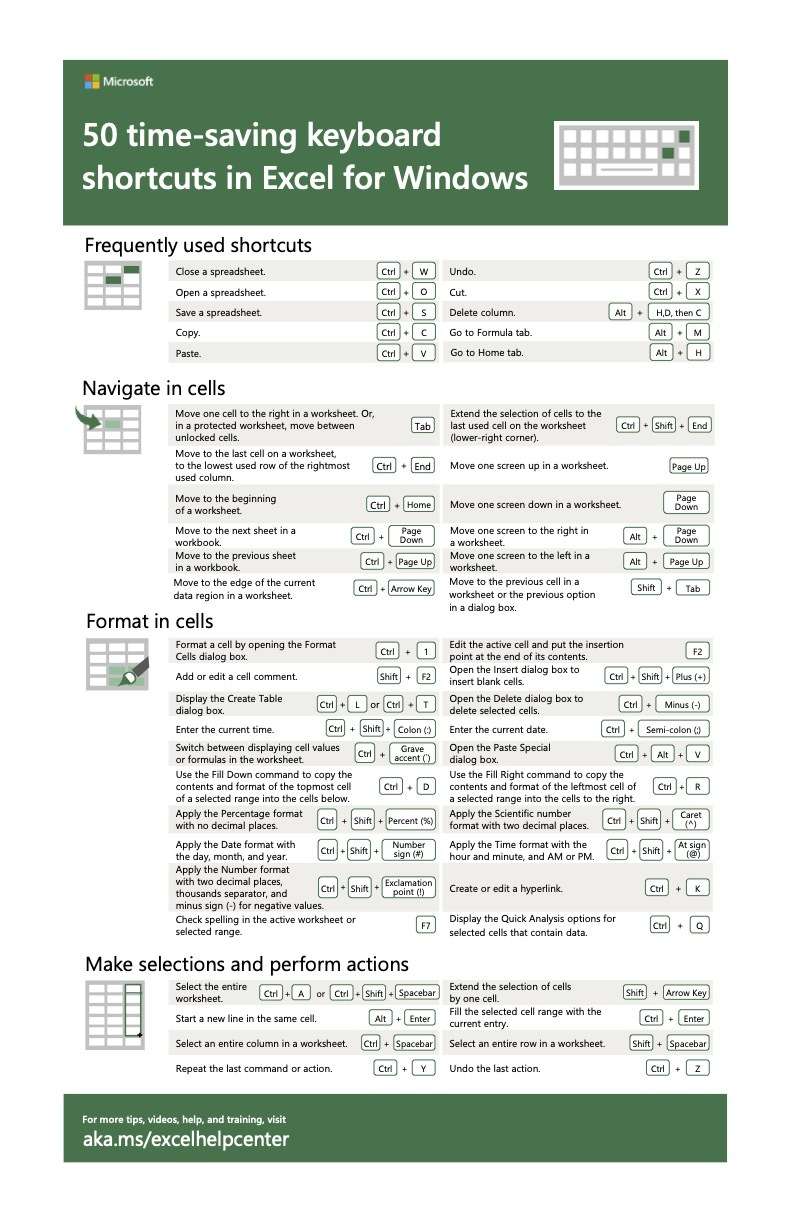
Frequently Used Excel Shortcuts

- Close a spreadsheet – Ctrl + W
- Undo – Ctrl + Z
- Open a spreadsheet – Ctrl + O
- Cut – Ctrl + X
- Save a spreadsheet – Ctrl + S
- Delete column – Alt + H, D, then C
- Copy – Ctrl + C
- Go to Formula tab – Alt + M
- Go to the Home tab – Alt + H
- Paste – Ctrl + V
Navigate in Cells
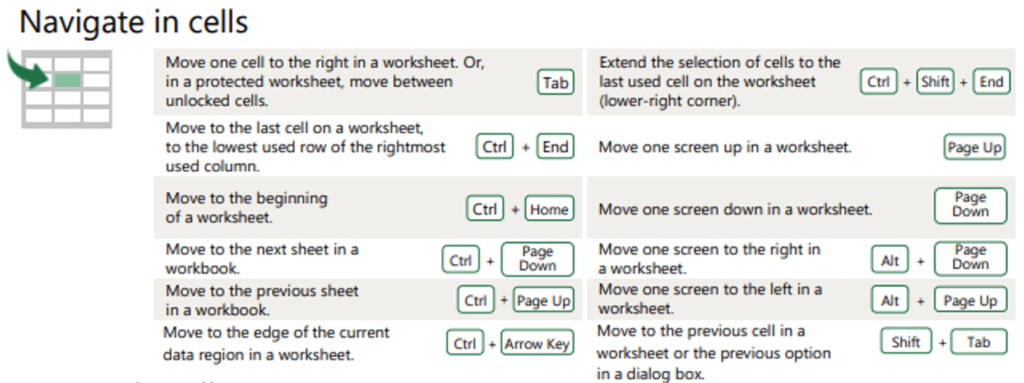
- Move one cell to the right in a worksheet. Also, in a protected worksheet, move between unlocked cells – Tab
- Move to the last cell on a worksheet, to the lowest used row of the rightmost used column – Ctrl + End
- Move to the beginning of a worksheet – Ctrl + Home
- Move to the next sheet in a workbook – Ctrl + Page Down
- Move to the previous sheet in a workbook – Ctrl + Page Up
- Move to the edge of the current data region in a worksheet – Ctrl + Arrow Key
- Extend the selection of cells to the last used cell on the worksheet (lower-right corner) – Ctrl + Shift + End
- Move one screen up in a worksheet – Page Up
- Move one screen down in a worksheet – Page Down
- Move one screen to the right in a worksheet – Alt + Page Down
- Move one screen to the left in a worksheet – Alt + Page Up
- Move to the previous cell in a worksheet or the previous option in a dialog box – Shift + Tab
Format in Cells
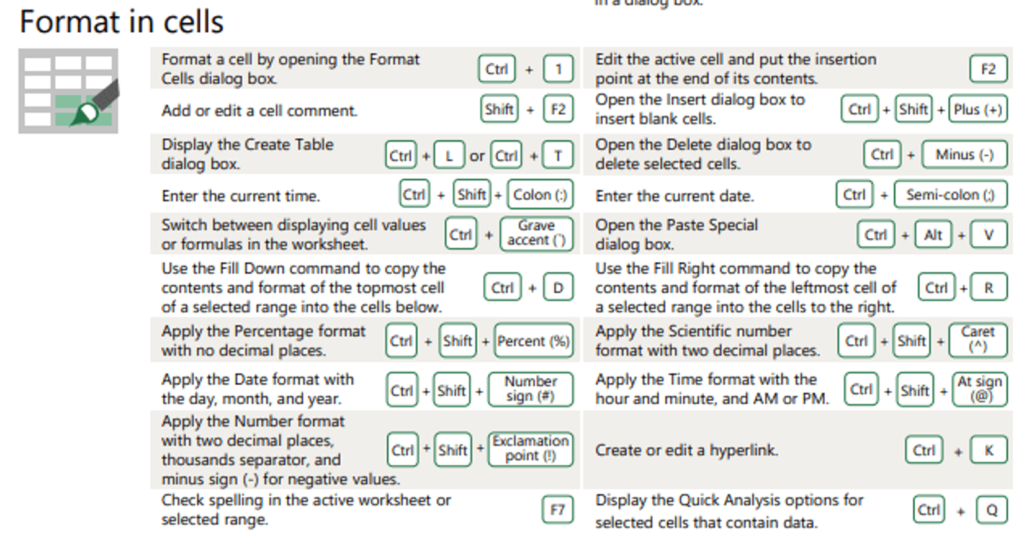
- Format a cell by opening the Format Cells dialog box – Ctrl + 1
- Add or edit a cell comment – Shift + F2
- Display the Create Table dialog box – Ctrl + L or Ctrl + T
- Enter the current time – Ctrl + Shift + Colon (:)
- Switch between displaying cell values or formulas in the worksheet – Ctrl + Grave accent (`)
- Use the Fill Down command to copy the contents and format of the topmost cell of a selected range into the cells below – Ctrl + D
- Apply the Percentage format with no decimal spaces – Ctrl + Shift + Percent (%)
- Apply the Date Format with the day, month, and year – Ctrl + Shift + Number sign (#)
- Apply the Number format with two decimal spaces, thousands separator, and minus sign (-) for negative values – Ctrl + Shift + Exclamation point (!)
- Check spelling in the active worksheet or selected range – F7
- Edit the active cell and put the insertion point at the end of its contents – F2
- Open the Insert dialog box to insert blank cells – Ctrl + Shift + Plus (+)
- Open the Delete dialog box to delete selected cells – Ctrl + Minus (-)
- Enter the current date – Ctrl + Semi-colon (;)
- Open the Paste Special dialog box – Ctrl + Alt + V
- Use the Fill Right command to copy the contents and format of the leftmost cell of a selected range into the cells to the right – Ctrl + R
- Apply the Scientific number format with two decimal spaces – Ctrl + Shift + Caret (^)
- Apply the Time Format with the hour and minute, and AM or PM – Ctrl + Shift + At Sign (@)
- Create or edit a hyperlink – Ctrl + K
- Display the Quick Analysis options for selected cells that contain data – Ctrl + Q
Make Selections and Perform Actions

- Select the entire worksheet – Ctrl + A or Ctrl + Shift + Spacebar
- Start a new line in the same cell – Alt + Enter
- Select an entire column in a worksheet – Ctrl + Spacebar
- Repeat the last command or action – Ctrl + Y
- Extend the selection of cells by one cell – Shift + Arrow Key
- Fill the selected cell range with the current entry – Ctrl + Enter
- Select an entire row in a worksheet – Shift + Spacebar
- Undo the last action – Ctrl + Z

The Bottom Line – Excel Shortcuts Are A Huge Boost for Productivity
Using Excel shortcuts, or shortcut keys is a sometimes neglected way to increase efficiency while working with an Excel model. Furthermore, there are various keyboard shortcuts for Excel that may be utilized to boost productivity. First, start by using these 50 shortcuts, and you’ll see the difference right away.
Furthermore, if you want to receive more finance tips like this, feel free to sign up for my newsletter. If you subscribe, every two weeks, you will receive an email from where I share best practices, career advice, templates, and insights for Finance Professionals.
Key Takeaways
- Excel provides numerous keyboard shortcuts that can significantly enhance speed and productivity.
- Excel shortcuts allow for quick execution of operations, reducing reliance on mouse interactions.
- Microsoft has compiled 50 time-saving Excel shortcuts for Windows users.
- These shortcuts are categorized into frequently used functions, cell navigation, cell formatting, selections, and actions.
- Utilizing Excel shortcuts can greatly improve efficiency and productivity while working on Excel models.
FAQ
1. What is the significance of Excel shortcuts?
- Excel shortcuts offer a quicker and more efficient way to perform tasks, reducing the reliance on manual mouse-based interactions and boosting overall productivity.
2. How many Excel shortcuts are covered in the list?
- The list comprises 50 Excel shortcuts that encompass frequently used functions, cell navigation, formatting, selections, and various actions.
3. How are the Excel shortcuts categorized?
- The Excel shortcuts are categorized into four types: frequently used functions, cell navigation, formatting in cells, and making selections and performing actions.
4. How can Excel shortcuts be beneficial for users?
- Utilizing Excel shortcuts streamlines the work process, allowing users to perform tasks with just a few keystrokes. This can save time, reduce repetitive actions, and enhance overall efficiency.


